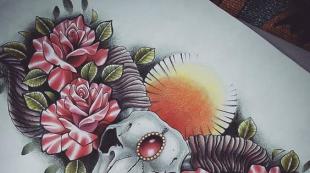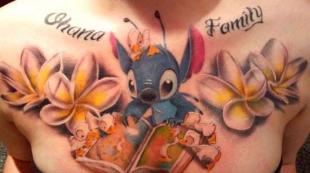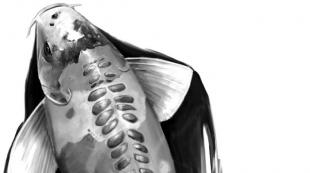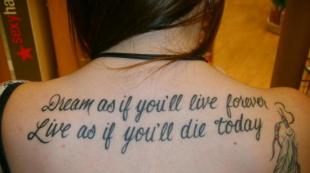And there is no barto in his younger years. Agnia Barto was afraid of Mayakovsky and made Ranevskaya a movie star. - Amazing story
A poem about a girl who put on her mother's things: high-heeled shoes, a short jacket and her mother's coat. Everyone looks at her and wonders who it is? And Natasha seems to be irresistible. The poem does not lose its relevance in our time, although it was written in the last century, in 1981. How important it is not to lose yourself by following fashion. This is especially emphasized by the last lines of the poem:
But, following fashion,
Don't spoil yourself!"
"Fashionista" Agniya Barto
We have Natasha fashionista,
She's having a hard time!
Natasha has heels
Like adults, high
Here is such a height
Here's a dinner!
Poor thing! Here is the sufferer
It goes, a little does not fall.
Baby with open mouth
Can't figure it out:
Are you a clown or an aunt?
On the head - a cap!
It seems to her - passers-by
Don't take your eyes off her
And they sigh: - My God,
Where did you come from?
Cap, short jacket
And mom's coat
Not a girl, not an aunt,
And no one knows who!
No, at a young age
Keep up with fashion
But, following fashion,
Don't spoil yourself!
Illustration for Agnia Barto's poem "Fashionista"
GRANDFATHER VITALY
Became a pensioner
Grandpa Vitaly,
Receives a pension
Right at home.
He wakes up in the morning
- Why did you get up so early?
You don't have to work!
They tell him.
Grandpa Vitaly
Was a cashier in a trust,
Gave out a salary
I hurried to the bank in the morning,
And now wake up -
And sits in place
And growls angrily:
- It's time to die!
- You would walk! -
Brides-in-law say
Hinting to grandfather:
He interferes here!
In a mailbox
Not a single agenda
More at the meeting
Grandpa is not named.
He comes from a walk
Dissatisfied, lethargic.
Take a walk with your grandson -
Grandfather loves grandson!
But Andryushka grew up,
In the fifth grade, small!
He has for his grandfather
Not a minute!
Then he rushes off to school!
He's at the bird market!
(The squad needs a dove
And two guinea pigs! ..)
Then somewhere he is at the collection,
He's in the gym
That sings in the choir
At the school festival!
And it's early in the morning
The grandson says to his grandfather:
We are looking for a veteran
For him to have a conversation.
Grandfather Vitaly sighs,
Shame on the old man
- fought a lot
We are in our lifetime.
Are you looking for a veteran?
You look at me!
Struggle, strangely enough,
And me in the old days!
In Moscow, at the barricade,
In the seventeenth year...
I myself am in your squad
I'll have a meeting!
- What happened to grandfather?
Surprised neighbors.
Grandpa Vitaly
Getting ready for a conversation.
Grandpa Vitaly
Got my medals
He put them on his chest.
We did not recognize grandfather -
So he got younger!
We have Natasha fashionista,
She's having a hard time!
Natasha has heels
Like adults, high
Here is such a height
Here's a dinner!
Poor thing! Here is the sufferer
It goes, a little does not fall.
Baby with open mouth
Will not understand in any way:
- Are you a clown or an aunt?
On the head - a cap!
It seems to her - passers-by
Don't take your eyes off her
And they sigh: - My God.
Where did you come from?
Cap, short jacket
And mom's coat
Not a girl, not an aunt,
And no one knows who!
No, at a young age
Keep up with fashion
But, following fashion,
Don't spoil yourself!
WHERE WILL I GO?
There are exemplary children
And I'm not exemplary:
Then I sang at the wrong time
Then I danced in the dining room.
There are exemplary children
For them ballet on ice
And new stadiums...
And where will I go?
They gave their timesheet
(There's no end to fives!)
And spin under the arches
District Palace.
And I went to such a circle,
References are required
That you didn't set fire to anything
And I didn't walk on the grass.
About planting seedlings
And he saw off all the old women ...
There to ride down the hill -
And then you need five!
There are exemplary children
For them ballet on ice
And new stadiums...
And where will I go?
IT HAPPENS…
Tanya was spinning on her toes,
Tanya was a butterfly
And circled and flew
Two nylon wings.
Klava screamed loudest of all,
So praised Tanya,
Admired: - Wonderful dance!
You are light like a butterfly!
You are thinner than a moth!
They said: “Bravo! Bravo!"
And Klava whispers to her neighbor:
- Tanya is not slim at all,
And it looks like an elephant.
It happens like this, they say in the eyes:
- You're a moth! You are a dragonfly!
And behind the back they laugh quietly -
Look, here comes the elephant.
WHERE ARE YOU, PAVEL?
The boy Pavel lived in the world,
merry fellow! Good guy!
If the holiday is in your house,
He shouts: - Let's dance! -
First of all, he congratulated you.
Well done! Good guy!
On Aunt Katya's birthday
He woke up at six in the morning
Jumped out of bed first
He says: - It's time to dance!
But, alas, it's completely inopportune
Aunt Katya fell ill.
You don't have to have fun
Birthday cancelled.
Gotta run for the medicine
Bring the pyramidon.
But where did Paul go?
Nice guy, nice guy?
He dissapeared!
Jumped up from the chair
And it was blown away by the wind!
THREE POINTS FOR THE OLD MAN
Larisa is standing at the blackboard,
Girl in a fluffy skirt
And translates into glasses
Good deeds.
All blackboard in numbers.
- For helping mom - two points,
Helping a little brother
I'm writing a point to Nikitin,
And Gorchakov has three points -
He took the old man to visit.
- Three points are not enough for this!
Shouting Andryusha Gorchakov
And jumps up from the bench.-
Three points for an old man?!
I need a raise!
I spent almost half a day with him
He managed to love me.
Larisa is standing at the blackboard,
Love puts on accounts
And translates into glasses
Attention and care.
And two girlfriends aside
They grumble, pouting their lips:
- And they didn't give me three points
For good deeds!
And I didn't expect this.
When I bathed my brother.
Then for good deeds
Not worth it at all!
Larisa is standing at the blackboard,
Girl in a fluffy skirt
And translates into glasses
Good deeds.
Oh, it's hard to even listen
Can't believe guys
What a warm heart
Someone needs to pay.
And if you need a fee,
Then the act is worthless!
BURN, BURN CLEAR!
Lyuba writes in the protocol:
“Well, the children in our school!
The speaker came to us
The guys are hiding.
Horrible, what a fidget!
Every day for them conversations,
Every day reports
And they are not happy!
We listened on air
Interesting "Bonfire":
Song "Twice two four"
The honored actor sang.
I read them an article -
Spin around in a chair;
I ask them a question
And they fell asleep! .. "
Love looked out the window
And in the garden the link sings:
- Burn, burn brightly
To not go out!
... The birds are flying
The bells are ringing.
Sings the whole link:
- Burn, burn bright! -
Love looked out the window
And everything became clear to her.
SECRET OF SUCCESS
Dissatisfied Yura walks
In apartments, in houses,
Yura asks frowningly
Neighborhood dads and moms
Yura asks gloomily:
- Do you have waste paper?
He is not in the spirit: he took it foolishly
Collect waste paper!
Someone looked at Yura:
- Enough to do without you.-
The old man slammed the door
In front of Yura
And mutters: - Believe it or not,
No waste paper.
An aunt in a black shawl came out,
They prevented her from eating.
He says: - Who are you?
Don't disturb me!
Who goes to the park of culture,
Who to the doctor for procedures,
And it sounds in Yura's ears:
"We don't have waste paper."
Suddenly some guy long
Yure declares after:
- In vain you walk with a sour mine,
That's why there's no point!
Yura instantly straightened his eyebrows,
Knocking on the door, full of energy,
The hostess "how is your health?"
Yura asked cheerfully.
Yura asks cheerfully:
- Do you have waste paper?
The hostess says: - There is ...
Would you like to sit down?
ON THE WAY, ON THE BOULEVARD
ON THE WAY, ON THE BOULEVARD
Snowy mountains glitter
whiteness,
And below, in the gardens of Sofia,
Summer heat.
Lilyana and Tsvetana,
Two little grinders
Early in the morning in Sofia
Rolled a hoop in the park.
- Roll, my hoop is yellow, -
Tsvetana sang after.-
I want you to go around
All countries, the whole world.
Along the track
Along the boulevard
All over the globe.
And helping a friend
Another girl sang:
- Spin around, my hoop is yellow,
Like the sun, shine!
Wherever you go
Don't deviate from the path!
Along the track
Along the boulevard
All over the globe.
Cheerful children's hoop,
Go all over the planet!
You with good regards
No wonder the children sent.
Along the track
Along the boulevard
All over the globe.
Spanish children - sons and daughters of Republican fighters who fought against the Nazis in Spain.
Lolita, you are ten years old
But you're used to everything
To night anxiety and shooting,
To your empty house.
And early in the morning at the gate
You stand alone for a long time.
Are you waiting for:
What if the father comes?
But what if
Is the war over?
No, fire again!
The houses are on fire.
Roaring projectile overhead
And you call the guys again
Watch funnels in the pavement.
There is a column passing by you,
And you are a familiar fighter
You shout: “Manolo, good afternoon!
Tell your father that I'm alive."
MAMITA MIA
Black-eyed Maria
Crying outside the car window
And repeats: "Mamita Miya!"
And "mamita" - mother means.
- Wait! Do not Cry! No need!-
Whispers a boy from Malaga.-
We are going to the children of Leningrad.
There are banners, songs, flags!
There we will live with friends.
You will write a letter to your mother.
Celebrate victory together
I will go to Madrid with you.
But curly Maria
Crying outside the car window
And repeats: "Mamita Miya!"
And "mamita" - mother means.
I'M WITH YOU
You can sleep. The window is closed
The door is bolted shut.
Eight year old Anita
The oldest is in the house now.
Anita says to her brother:
- The moon in the sky went out,
From fascist planes
Darkness will cover us.
Don't be afraid of the dark:
You can't see in the dark.
And when the fight starts
Don't be afraid, I'm with you...
OVER THE SEA STARS
Stars above the sea
It's dark in the mountains.
Picking up Fernando
Leads the link.
Why appointed
Gathering today?
Fascists city
They storm from the mountains.
Here's a muffled sigh
A projectile in the mountains.
Why Fernando
Did you call the guys?
He whispers: - Listen,
bridge destroyed,
In the village nearby
Fascist post.
Until it dawns
Dawn in the mountains
Let's take the rifles
There are no panties here!
Hooted somewhere again
Away the projectile
The boys are coming
Chain in a row.
To collect the last
There is a link.
Stars above the sea
It's dark in the mountains.
Roberto ... We are sitting together,
And you tell me
About the hard days, about the war,
About your wounded brother.
How the projectile falls
Throwing up a pillar of earth,
And as your friends, guys,
They were taken to a nearby hospital...
That mother often cries
And there is no news from the father,
And what can you shoot
No worse than an adult fighter.
You ask me to take you with me
When the detachment goes to the front.
Roberto, your childish voice
This year has become rough.
There is a custom in Spain:
They call the palm tree in the grove
Glorious name of the hero,
Winner in battle.
You've never been in a fight
Didn't hold a rifle
But they called a palm tree in a grove
In your bright memory.
You've never been in a fight
But there was a roar of a shell, -
You were wounded in a peaceful home
The night the enemies came
To the 110th anniversary of the birth of Agnia Lvovna Barto
“I love you and wrap you in paper, when you were torn, I glued you together,” Agnia Barto read these words in one children's letter. The writer received letters from grateful readers in large numbers, but it was children's letters that she rejoiced most of all, they were for her "universal glue" that helped restore strength.
“It seems to me that Agnia Barto was always there when I was little - I had her books, first my mother read to me, then I myself,” recalls Galina Fortygina, librarian of the fiction subscription. - My child grew up too - and I read to him books by Agniya Barto, which were preserved from my childhood and, of course, we enjoyed buying new ones. And it's not just in our family. I think (and hope) that this tradition of reading Agniya Barto's books will continue to exist for a very long time.
If a writer is remembered for such a long time, his books are read and re-read, passing his word from generation to generation - is this not the best recognition!
 Tarpaulin
Tarpaulin
Rope in hand
I am pulling a boat
On the fast river.
And the frogs jump
Behind me,
And they ask me:
Roll on, captain!
Or
No, in vain we decided
Ride a cat in a car:
The cat is not used to riding -
Overturned a truck.

Agnia Barto was born in Moscow on February 17, 1906. Although the date is not entirely correct, in fact Agnia Lvovna was born in 1907. An extra year in her biography did not come just like that; during the war years, young Agnia had to add age to herself in order to be hired. Father, Lev Nikolaevich Volov, was a veterinarian, his mother was a housewife. The girl studied at the gymnasium, studied ballet, was fond of poetry. And although she graduated from a choreographic school and was accepted into a ballet group, dance did not become her life's work. Like many girls at that time, Agnia was passionately fond of poetry and was a “podahmatovka”, as Anna Akhmatova’s imitators were called. She tried to compose herself, wrote poems about knights, gray-eyed kings, pale skies and rosy roses, until she discovered Mayakovsky. Since then, all tender images have been forgotten, and the poetess's poetic album began to be filled with "ladder" and puns. Agnia Barto considered Mayakovsky one of her main teachers, it was from him that she learned the art of new forms. The influence of Mayakovsky, his artistic traditions were felt in the poetry of Agnia Barto all her life.
The youth of Agnia Volova, like many of her compatriots born at the beginning of the 20th century, fell on the years of the revolution and civil war. The family survived these times without falling into hellish millstones. But there were not enough funds and products and Agnia had to work, she became a seller in the Clothes store. She continued to dance and write poetry, but, of course, she did not see herself as a professional poet. An important life decision was helped by the case in the person of A.V. Lunacharsky.

At one of the theater evenings at the choreographic school, Agnia read her poem "The Funeral March", it was tragic in content and sounded to the music of Chopin. But Anatoly Vasilyevich Lunacharsky, People's Commissar for Education, who was present at this evening (he was not only a Bolshevik and Lenin's ally, but also a writer and literary critic) could not help laughing. What amused this man so much remains unknown, but the fact is known that he invited the young ballerina to the People's Commissariat for Education and gave good advice, advice - to seriously engage in poetry and write not just poetry, but poetry for children. With what instinct did he see in her this special gift, this rare talent? Thus, the beginning was laid, the impetus was set for the professional career of the future poetess, and it was in 1920. Many years later, Agnia Lvovna recalled with irony the fact that the first steps of her creative path were rather insulting. Of course, for youth, it is more preferable when your tragic talent is recognized, and not comic.
In 1924 she graduated from the choreographic school and was accepted into the ballet troupe. Foreign tours were planned, in which Agnia, at the insistence of her father, did not take part. The next significant fact from her biography is marriage. At the age of eighteen, Agniya Volova married a man who gave her the surname Barto. The poet Pavel Barto became her husband, together they wrote several poems, including "The Rye Girl" and "The Dirty Girl". They had a son, Edgar, but the marriage did not last long. A few years later, Agniya Barto left this family and creative union, having met her true love. Her second marriage, with the energy scientist A.V. Shcheglyaev, became long and happy. Their daughter Tatyana Andreevna always said that her parents loved each other very much.

The first successful poems were written in the mid-20s - these are "Chinese Wang Li", "Bear-thief", "Pioneers", "Brother", "May Day". They were popular due to their themes, closely related to the new interests of children, as well as publicistic pathos, still rare in children's poetry. She spoke directly to the young reader on serious moral and ethical topics and did not hide the educational tendency under the game or fiction. It was also important that she developed a new big topic for a children's book - the social behavior of the child. Examples are the poems "Girl-Revushka" and "Girl Dirty".


—Oh you dirty girl
where did you get your hands dirty?
Black palms;
on the elbows - paths.
- I'm in the sun
lay,
hands up
kept.
THIS IS THEY BURNING.
- Oh, you dirty girl,
where did you get your nose so dirty?
The tip of the nose is black
like sooty.
- I'm in the sun
lay,
nose up
kept.
HERE IT HAS BEEN BURNED.
— Oh you dirty girl
legs in stripes
smeared,
not a girl
a zebra,
legs-
Like a negra.
- I'm in the sun
lay,
heels up
kept.
THIS IS THEY BURNING.
— Oh, right?
Was it so?
Let's wash it all down.
Come on, give me some soap.
WE WILL REMOVE IT.
The girl screamed loudly
as I saw the washcloth,
scratched like a cat
- Do not touch
palms!
They won't be white
they are tanned.
AND THE PALM WERE WASHED.
Wiped the nose with a sponge -
broke down to tears:
— Oh, my poor
spout!
He soap
can't stand it!
It won't be white
he's tanned.
AND THE NOSE WAS ALSO WASHED.
Laundered stripes -
— Oh, I'm ticklish!
Remove the brushes!
There will be no white heels,
they are tanned.
AND THE HEEL IS ALSO WASHED.
— Now you are white
Not tanned at all.

In her poems one could discern satire, in which the undoubted influence of Mayakovsky was traced. However, Barto's satire was always muffled by soft lyrical intonation, which was taught by another master, Korney Chukovsky. He demanded lyricism from the young poetess (“... only lyricism makes wit humor,” he wrote to her), careful finishing of the form instead of “frills and frills” of deft forms, with which it is so easy to impress an inexperienced reader.
Barto continued to write for children and on behalf of children - this was her calling. Children were the heroes of all her poems - boys and girls, kids and schoolchildren, they lived a real life and their portraits were very recognizable, and the images were convincing. A significant part of the poetess's poems are children's portraits, and in each of them a lively child's individuality is visible, which is generalized to an easily recognizable type. Many of the poems contain a child's name. For example, "Fidget", "Chatterbox", "Queen", "Kopeikin", "Novichok", "Vovka - a kind soul", "Katya", "Lyubochka". In her work, Barto considered it important to give a psychological portrait of the child, but at the same time she did not go into moralizing. She skillfully noticed the age characteristics and "problematic" features of children and invited them to look at themselves from the outside and engage in self-education. Here Agniya Barto seemed to be laughing at her heroes, but she did it tactfully, with mild irony, avoiding stupid and evil laughter. In some ways, she also helped parents, letting them know that children's shortcomings are formed by adults themselves. Laziness, self-interest, greed, narcissism, lies, childish anger are easily eliminated if you pay attention to them in time. Parents, who usually read books to their children, should see these clues coming from a sensitive and kind person.
Queen
If you're still nowhere
Didn't meet the queen
Look - here she is!
She lives among us.
Everyone, right and left
The queen announces:
- Where is my coat? Hang him up!
Why is he not there?
I have a heavy portfolio
Bring it to school!
I charge the duty officer
Bring me a cup of tea
And buy me at the buffet
Each, each one candy.
The queen is in third grade
And her name is Nastasya.
Bow at Nastya
Like a crown
like a crown
From kapron.
In 1936, Agnia Barto's poem cycle "Toys" was published - these are poems about kids and for kids. The author of "Toys" received great love and popularity all over the people and became one of the most beloved poets speaking the language of children. “Bear”, “Goby”, “Elephant”, “Truck”, “Ship”, “Ball” and other poems are remembered by children quickly and with great pleasure - they sound as if the child himself spoke, i.e. they reproduce features of vocabulary and syntax of the child.
Among the "baby" poems of Agnia Barto there are those that are devoted to important moments in the life of a child's family, for example, the birth of a brother or sister. The author shows how this event turns the lives of older children. Some of them feel lost and useless, while others, on the contrary, begin to realize their adulthood and show concern. "Resentment", "Nastenka", "Sveta thinks", "Mosquitoes", etc.
In the prewar years, Agnia Lvovna created a poetic image of Soviet childhood. Happiness, health, inner strength, the spirit of internationalism and anti-fascism - these are the common features of this image. “The house has moved” (1938), “Cricket” (1940), “Rope” (1941), in which the author shows that Soviet children can have fun, walk, work peacefully.
Rope
Spring, spring outside
Spring days!
 Like birds are flooding
Like birds are flooding
Tram calls.
Noisy, funny
Spring Moscow.
Not yet dusty
Green foliage.
Rooks roar on a tree,
Trucks rumble.
Spring, spring outside
Spring days!
The girls think in chorus
Ten times ten.
Champions, Masters
They carry jumpers in their pockets,
They've been jumping since morning.
In the yard and on the boulevard
In the alley and in the garden
And on every sidewalk
In front of passers-by
And from a run
And in place
And two legs
Together.
Lidochka stepped forward.
Lida takes the rope.
The spring of 1941 in Moscow, the war had not yet happened and life was in full swing in the city, there were many carefree children and passers-by on the street. Lidochka, the main character, is a match for the “noisy, cheerful, spring” capital. The poem "Rope" perfectly conveys the mood that embraces everyone on the first warm spring days and sounds like a hymn to resurgent nature and childhood.

The next important milestone in the life of the famous poetess happened with the beginning of the war. Agnia Lvovna's husband was a famous engineer, a specialist in steam turbines, and he was sent to work in Sverdlovsk. Together with him, the family went to the Urals. And here the writer was not left without work. She continued to write poetry, performed in hospitals, in schools, on the radio. But she needed a new type, a new matured hero. And then Barto asked for advice from Pavel Bazhov, with whom she had the opportunity to communicate: how to approach the topic. He took her to a meeting of artisans, where he spoke, and then offered to go to study with them. So Agniya Barto entered a vocational school to learn turning skills. For her, it was a new communication experience necessary to understand the new young generation growing up in wartime. To this period can be attributed the poetic cycle "Urals fight great", the collection "Teenagers" (1943), the poem "Nikita" (1945).
It is impossible not to mention one completely selfless act of Agnia Lvovna Barto, the mother of two children. During the war years, she stubbornly sought a business trip to the front and, having hardly received permission, spent twenty-two days on the front line. She explained this by the fact that she could not write about the war for children without visiting the place where bullets whistle.
In the days of the war
The eyes of a seven year old girl
Like two faded lights.
More noticeable on a child's face
Great, heavy sadness.
She is silent, no matter what you ask,
You joke with her - she is silent in response,
Like she's not seven, not eight
And many, many bitter years.
The Shcheglyaev-Barto family returned to Moscow in May 1945, the war was about to end. But Agnia Lvovna did not manage to fully experience the happiness of Victory Day, a few days before that, by a tragic accident, her seventeen-year-old son died. A terrible, incomparable tragedy. To get used to grief, Barto plunged into work, began to visit orphanages. She spoke to the children, read poetry, watched their lives. Thus, a new theme arose in the work of the poetess - the theme of protecting childhood from the troubles of the adult world.
In 1947, Agnia Barto's poem "Zvenigorod" was published. In it, she described the orphanage - the house in which children live, whose parents died in wartime, and their memories. It was still the same recognizable Agniya Barto, with her light, lyrical style, but hidden bitterness and tragedy were heard in the intonations.
Gathered guys:
To this house in the days of war
Sometime they brought...
After, almost a whole year,
children drawing
Downed black plane
 House among the ruins.
House among the ruins.
Suddenly there is silence
Something the kids will remember...
And, like an adult, by the window
Suddenly, Petya falls silent.
He still remembers his mother...
Can't remember -
She is only three years old.
Nikita has no father
His mother is killed.
Picked up two fighters
By the burnt porch
Boy Nikita.
Klava had an older brother,
curly lieutenant,
Here it is on the card
With one-year-old Klava.
He defended Stalingrad,
Fought near Poltava.
Children of warriors
in this orphanage.
Album cards.
That's what family is here -
Daughters and sons are here.
The time that Agniya Barto spent in orphanages turned into new experiences and new worries, which stretched out for almost nine years. The starting point was the poem "Zvenigorod", it was read by people who also lost their children in wartime. And then one woman wrote a letter to Agnia Barto, there were no requests in it, only one hope that her daughter might still be alive and ended up in a good orphanage. The writer could not leave this trouble unattended and made every effort to find a person. And found. The story, of course, did not end there. When this case became widely known, letters began to come to Agniya Barto asking for help, which also did not go unnoticed. As a result, in 1965, the program “Find a Person” appeared on Mayak radio, to which the writer devoted 9 years of her life. Every month, on the 13th, millions of radio listeners gathered at the radio receivers, and each time they heard the voice of Agnia Lvovna Barto. And for her, this day was special, because she could report that two more (or more) lost souls had met, who were scattered along the military roads. With the help of this program, 927 families were connected. “And although the search for almost nine years dominated my thoughts, all my time, along with the last transmission, something precious left my life,” Agnia Lvovna wrote later in her diary. Otherwise, she could not. The work of searching for people, communication with those who searched and found later became the content of the book “Find a Person”. It has been reprinted several times.
In the post-war period, Agniya Barto visited several foreign countries. From each trip she brought children's poems, drawings. At first, just for myself, and then I thought that it would be interesting for others. "Little poets" - so jokingly she called the little authors. The result of international communication was the collection "Translations from Children" (1976), which included poems written by children from different countries. But, according to the poetess herself, these were not translations. She explained as follows: “Translations of their poems? No, the poems of children, but they were written by me ... Of course, I do not know many languages. But I know the language of children. And therefore, in interlinear translation, I try to catch the feelings of children, to understand what they think about friendship, about the world, about people.”
December 8, 2014, 13:57♦ Agnia Lvovna Barto (1906-1981) was born on February 17 in Moscow in the family of a veterinarian. She received a good home education, which was led by her father. She studied at the gymnasium, where she began to write poetry. At the same time she studied at the choreographic school.
♦ The first time Agniya got married early: at the age of 18. young handsome poet Pavel Barto, who had English and German ancestors, immediately liked the talented girl Agnia Volova. They both idolized poetry and wrote poetry. Therefore, the young people found a common language right away, but ... Nothing but poetic research connected their souls. Yes, they had a common son, Igor, whom everyone at home called Garik. But it was with each other that the young parents suddenly became incredibly sad.  And they parted ways. Agnia herself grew up in a strong, friendly family, so divorce was not easy for her. She was worried, but soon devoted herself entirely to creativity, deciding that she should be true to her calling.
And they parted ways. Agnia herself grew up in a strong, friendly family, so divorce was not easy for her. She was worried, but soon devoted herself entirely to creativity, deciding that she should be true to her calling.
♦ Agnia's father, Moscow veterinarian Lev Volov wanted his daughter to become a famous ballerina. Canaries sang in their house, Krylov's fables were read aloud. He was known as a connoisseur of art, loved to go to the theater, especially loved ballet. That is why young Agnia went to study at the ballet school, not daring to resist the will of her father. However, in between classes, she enthusiastically read the poems of Vladimir Mayakovsky and Anna Akhmatova, and then wrote down her creations and thoughts in a notebook. Agnia, according to her friends, at that time was outwardly similar to Akhmatova: tall, with a bob haircut ... Under the influence of the work of her idols, she began to compose more and more often.
♦ At first, these were poetic epigrams and sketches. Then came the poetry. Once, at a dance performance, Agnia, to the music of Chopin, read her first poem "Funeral March" from the stage. At that moment, Alexander Lunacharsky entered the hall. He immediately saw the talent of Agnia Volova and offered to engage in literary work professionally. Later, he recalled that, despite the serious meaning of the poem, which he heard performed by Agnia, he immediately felt that she would write funny poems in the future.
♦ When Agnia was 15 years old, she got a job at the clothing store - she was too hungry. The salary of the father was not enough to feed the whole family. Since they were hired only from the age of 16, she had to lie that she was already 16. Therefore, until now, Barto's anniversaries (in 2007 it was 100 years since the birth) are celebrated two years in a row. ♦ She always had a lot of determination: she saw the goal - and forward, without swaying and retreating. This feature of her showed through everywhere, in every little thing. Once in Spain, torn apart by the Civil War, where Barto went to the International Congress for the Defense of Culture in 1937, where she saw with her own eyes what fascism was (congress meetings were held in a besieged burning Madrid), and just before the bombing she went to buy castanets. The sky howls, the walls of the store bounce, and the writer makes a purchase! But after all, the castanets are real, Spanish - for Agnia, who danced beautifully, it was an important souvenir. Alexey Tolstoy then, with malice, he was interested in Barto: did she buy a fan in that shop in order to fan herself during the next raids? ..
♦ In 1925 Agnia Barto's first poems "Chinese Wang Li" and "Bear Thief" were published. They were followed by "The First of May", "Brothers", after the publication of which the famous children's writer Korney Chukovsky said that Agniya Barto is a great talent. Some poems were written jointly with her husband. By the way, despite his reluctance, she kept his last name, with which she lived until the end of her days. And it was with her that she became famous all over the world. 
♦ The first huge popularity came to Barto after he saw the light of a cycle of poetic miniatures for the smallest "Toys" (about a bull, a horse, etc.) - in 1936 Agnia's books began to be published in gigantic editions ... 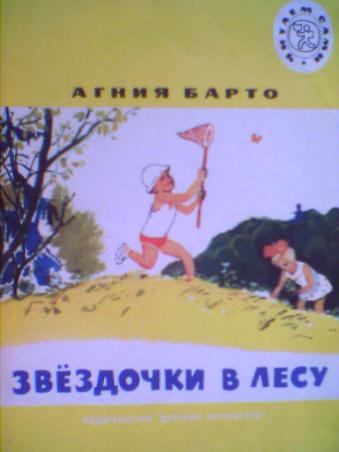
♦ Fate did not want to leave Agnia alone and one fine day brought her to Andrey Shcheglyaev.  This talented young scientist purposefully and patiently courted a pretty poetess. At first glance, these were two completely different people: a "lyricist" and a "physicist". Creative, sublime Agniya and heat power engineer Andrey. But in reality, an extremely harmonious union of two loving hearts has been created. According to family members and close friends of Barto, for almost 50 years that Agnia and Andrei lived together, they never quarreled. Both worked actively, Barto often went on business trips. They supported each other in everything. And both became famous, each in their own field. Agnia's husband became famous in the field of thermal power engineering, becoming a corresponding member of the Academy of Sciences.
This talented young scientist purposefully and patiently courted a pretty poetess. At first glance, these were two completely different people: a "lyricist" and a "physicist". Creative, sublime Agniya and heat power engineer Andrey. But in reality, an extremely harmonious union of two loving hearts has been created. According to family members and close friends of Barto, for almost 50 years that Agnia and Andrei lived together, they never quarreled. Both worked actively, Barto often went on business trips. They supported each other in everything. And both became famous, each in their own field. Agnia's husband became famous in the field of thermal power engineering, becoming a corresponding member of the Academy of Sciences.
 ♦ Barto and Shcheglyaev had a daughter, Tanya, about whom there was a legend that it was she who was the prototype of the famous rhyme: “Our Tanya is crying loudly.” But this is not so: poetry appeared earlier. Even when the children grew up, it was decided to always live as a big family under the same roof, together with the wives-husbands of the children and grandchildren - Agnia wanted so much.
♦ Barto and Shcheglyaev had a daughter, Tanya, about whom there was a legend that it was she who was the prototype of the famous rhyme: “Our Tanya is crying loudly.” But this is not so: poetry appeared earlier. Even when the children grew up, it was decided to always live as a big family under the same roof, together with the wives-husbands of the children and grandchildren - Agnia wanted so much.
♦ In the late thirties, she went to this "neat, clean, almost toy country", heard Nazi slogans, saw pretty blond girls in dresses "decorated" with a swastika. She realized that war with Germany was inevitable. To her, sincerely believing in the universal brotherhood, if not adults, then at least children, all this was wild and scary. But the war had not been too hard on her. She was not separated from her husband even during the evacuation: Shcheglyaev, who by that time had become a prominent power engineer, was sent to the Urals. Agnia Lvovna had friends in those parts who invited her to live with them. So the family settled in Sverdlovsk. The Urals seemed distrustful, closed and harsh people. Barto had a chance to meet Pavel Bazhov, who fully confirmed her first impression of the locals. During the war, Sverdlovsk teenagers worked at defense factories instead of adults who had gone to the front. They were wary of the evacuees. But Agnia Barto needed to communicate with children - she drew inspiration and plots from them. In order to be able to communicate with them more, Barto, on the advice of Bazhov, received the profession of a turner of the second category. Standing at the lathe, she argued that "also a man." In 1942, Barto made one last attempt to become an "adult writer". Or rather, a front-line correspondent. Nothing came of this attempt, and Barto returned to Sverdlovsk. She understood that the whole country lives according to the laws of war, but still she missed Moscow very much.
♦ Barto returned to the capital in 1944, and almost immediately life went back to normal. In the apartment opposite the Tretyakov Gallery, the housekeeper Domash was again engaged in housekeeping. Friends were returning from evacuation, son Garik and daughter Tatyana again began to study. Everyone was looking forward to the end of the war. On May 4, 1945, Garik returned home earlier than usual. Home was late with dinner, the day was sunny, and the boy decided to ride a bicycle. Agnia Lvovna did not object. It seemed that nothing bad could happen to a fifteen-year-old teenager in the quiet Lavrushinsky Lane. But Garik's bicycle collided with a truck that had come around the corner. The boy fell to the pavement, hitting his temple on the sidewalk curb. Death came instantly.  With son Igor
With son Igor
♦ We must pay tribute to Agnia Lvovna's strength of spirit - she did not break. Moreover, her salvation was the cause to which she devoted her life. After all, Barto also wrote scripts for films. For example, with her participation, such well-known tapes as "Foundling" with Faina Ranevskaya, "Alyosha Ptitsyn develops character" were created. She was also active during the war: she went to the front with the reading of her poems, spoke on the radio, and wrote for newspapers. And after the war, and after the personal drama, she did not cease to be at the center of the country's life.  Frame from the film "Foundling"
Frame from the film "Foundling"
 "
Alyosha Ptitsyn develops character" (1953)
"
Alyosha Ptitsyn develops character" (1953)
♦ Later, she was the author of a large-scale campaign to search for relatives who were lost during the war. Agniya Barto began to host a program on the radio Find a Person, where she read out letters in which people shared fragmentary memories that were not enough for an official search, but viable for word of mouth. For example, someone wrote that when he was taken away from home as a child, he remembered the color of the gate and the first letter of the street name. Or one girl remembered that she lived with her parents near the forest and her dad's name was Grisha ... And there were people who restored the overall picture. For several years of work on the radio, Barto was able to unite about a thousand families. When the program was closed, Agniya Lvovna wrote the story "Find a Man", which was published in 1968.
♦ Agniya Barto, before submitting the manuscript for printing, wrote an infinite number of options. Be sure to read poems aloud to household members or by phone to fellow friends - Kassil, Svetlov, Fadeev, Chukovsky. She listened carefully to criticism, and if she accepted, she redid it. Although once she categorically refused: the meeting, which decided the fate of her "Toys" in the early 30s, decided that the rhymes in them - in particular in the famous "They dropped the bear on the floor ..." - were too difficult for children.
 Tatyana Shcheglyaeva (daughter)
Tatyana Shcheglyaeva (daughter)
“She did not change anything, and because of this, the book came out later than it could have,” remembers daughter Tatyana - Mom was generally a person of principle and often categorical. But she had a right to it: she did not write about what she did not know, and she was sure that children should be studied. I have been doing this all my life: I read letters sent to Pionerskaya Pravda, went to nurseries and kindergartens - sometimes for this I had to introduce myself as an employee of the public education department - listened to what children were talking about, just walking along the street. In this sense, my mother always worked. Surrounded by kids (still young)
♦ House Barto was the head. The last word was always hers. The household took care of her, did not demand to cook cabbage soup and bake pies. This was done by Domna Ivanovna. After the death of Garik, Agnia Lvovna began to fear for all her relatives. She needed to know where everyone was, that everyone was all right. “Mom was the main helmsman in the house, everything was done with her knowledge,” recalls Barto's daughter, Tatyana Andreevna. - On the other hand, they took care of her and tried to create working conditions - she did not bake pies, she did not stand in lines, but, of course, she was the mistress of the house. Nanny Domna Ivanovna lived with us all her life, who came to the house back in 1925, when my elder brother Garik was born. This was a very dear person for us - and the hostess is already in a different, executive sense. Mom always took care of her. She could, for example, ask: “Well, how am I dressed?” And the nanny said: “Yes, it’s possible” or: “Strangely gathered”
♦ Agnia has always been interested in raising children. She said: “Children need the whole gamut of feelings that give birth to humanity” . She went to orphanages, schools, talked a lot with the kids. Traveling around different countries, I came to the conclusion that a child of any nationality has a rich inner world. For many years, Barto headed the Association of Literature and Art for Children, was a member of the international Andersen jury. Barto's poems have been translated into many languages of the world.
♦ She passed away on April 1, 1981. After the autopsy, the doctors were shocked: the vessels were so weak that it was not clear how the blood had flowed into the heart for the past ten years. Once Agniya Barto said: "Almost every person has moments in his life when he does more than he can." In her case, it was not a minute - she lived like that all her life. 
♦ Barto loved to play tennis and could arrange a trip to capitalist Paris to buy a pack of drawing paper she liked. But at the same time, she never had a secretary, or even a study - only an apartment in Lavrushinsky Lane and an attic in a dacha in Novo-Daryino, where there was an old card table and books piled up in piles.
♦ She was non-confrontational, adored practical jokes and did not tolerate swagger and snobbery. Once she arranged a dinner, set the table - and attached a sign to each dish: "Black caviar - for academicians", "Red caviar - for corresponding members", "Crabs and sprats - for doctors of sciences", "Cheese and ham - for candidates "," Vinaigrette - for laboratory assistants and students. They say that this joke sincerely amused the laboratory assistants and students, but the academicians lacked a sense of humor - some of them were then seriously offended by Agnia Lvovna.
♦ Seventies. In the Writers' Union meeting with Soviet cosmonauts. On a piece of paper from a notebook, Yuri Gagarin writes: "They dropped the bear on the floor ..." and hands it to the author, Agniya Barto. When Gagarin was subsequently asked why these particular verses, he replied: "This is the first book about kindness in my life."
Updated on 08/12/14 14:07:
Oops ... I forgot to insert a piece from myself at the beginning of the post)) Probably, it was Agnia Barto's poems that influenced the fact that since childhood I feel sorry for dogs, cats, grandparents who beg for alms (I'm not talking about those who are like watch every day stand in the same subway crossings ...). I remember, as a child, I watched the cartoon "Cat's House" and literally sobbed - I felt so sorry for the Cat and the Cat, because their house burned down, but they were pitied by the kittens, who themselves have nothing))))) (I know it's Marshak). But the poor child (I) was crying from my pure, naive, childish kindness! And I learned kindness not only from mom and dad, but also from such books and poems that Barto wrote. So Gagarin very accurately said ...
Updated on 08/12/14 15:24:
Persecution of Chukovsky in the 30s
Such a fact was. Chukovsky's children's poems were severely persecuted during the Stalin era, although it is known that Stalin himself repeatedly quoted The Cockroach. The persecution was initiated by N. K. Krupskaya, inadequate criticism came from both Agnia Barto and Sergei Mikhalkov. Among the party critics of the editors, even the term "Chukovshchina" arose. Chukovsky undertook to write an orthodox-Soviet work for children, The Merry Collective Farm, but did not do so. Although other sources say that she did not quite poison Chukovsky, but simply did not refuse to sign some kind of collective paper. On the one hand, not in a comradely way, but on the other ... Decide for yourself) In addition, in recent years, Barto visited Chukovsky in Peredelkino, they maintained a correspondence ... So either Chukovsky is so kind, or Barto asked for forgiveness, or we we don't know much.
In addition, Barto was also seen in the persecution of Marshak. I quote: " Barto came to the editorial office and saw proofs of Marshak's new poems on the table. And he says: "Yes, I can write such poems at least every day!" To which the editor replied: "I beg you, write them at least every other day ..."
Updated on 09/12/14 09:44:
I continue to reveal the topic of bullying)) As for Marshak and others.
At the end of 1929 - beginning of 1930. on the pages of "Literaturnaya Gazeta" a discussion "For a truly Soviet children's book" unfolded, which set three tasks: 1) to reveal all kinds of hack work in the field of children's literature; 2) to promote the formation of principles for the creation of truly Soviet children's literature; 3) to unite qualified cadres of real children's writers.
From the very first articles that opened this discussion, it became clear that she had taken a dangerous path, the path of persecution of the best children's writers. The works of Chukovsky and Marshak were summed up under the heading of "defective literature" and simply hack-work. Some participants in the discussion "discovered" the "alien orientation of Marshak's literary talent" and concluded that he was "obviously alien to us in ideology" and his books were "harmful and empty." Starting in the newspaper, the discussion soon spread to some magazines. The discussion exaggerated the mistakes of talented authors and propagated the non-fiction works of some writers.
The nature of the attacks, the tone in which these attacks were expressed, were absolutely unacceptable, as a group of Leningrad writers stated in their letter: "attacks on Marshak are in the nature of harassment."

